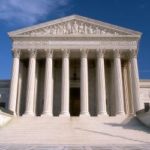This documentary explores the Supreme Court cases Cherokee Nation v. Georgia (1831) and Cooper v. Aaron (1958) that defined our understanding of the role of the judiciary. In Cherokee Nation, the Supreme Court ruled it lacked the jurisdiction to review the claims of an Indian nation in the U.S. In Cooper v. Aaron, the Court affirmed that its interpretation of the Constitution was the “supreme law of the land” and that states were bound by its decisions. A PDF lesson guide is provided.
A Deep Stain on the American Character: John Marshall and Justice for Native Americans
In this lesson, students will learn about the actions of John Marshall concerning the Cherokee nation. They will explore how his actions helped to advance justice and, through his example, learn how they can advance justice in their own lives.
A Conversation on Judicial Independence

Justices Stephen G. Breyer, Anthony M. Kennedy and Sandra Day O’Connor and high school students discuss why an independent judiciary is necessary and how Article III, Section1, in the Constitution safeguards the role of judges. This video complements the documentary An Independent Judiciary: Cherokee Nation v. Georgia and Cooper v. Aaron.
